Listen below!
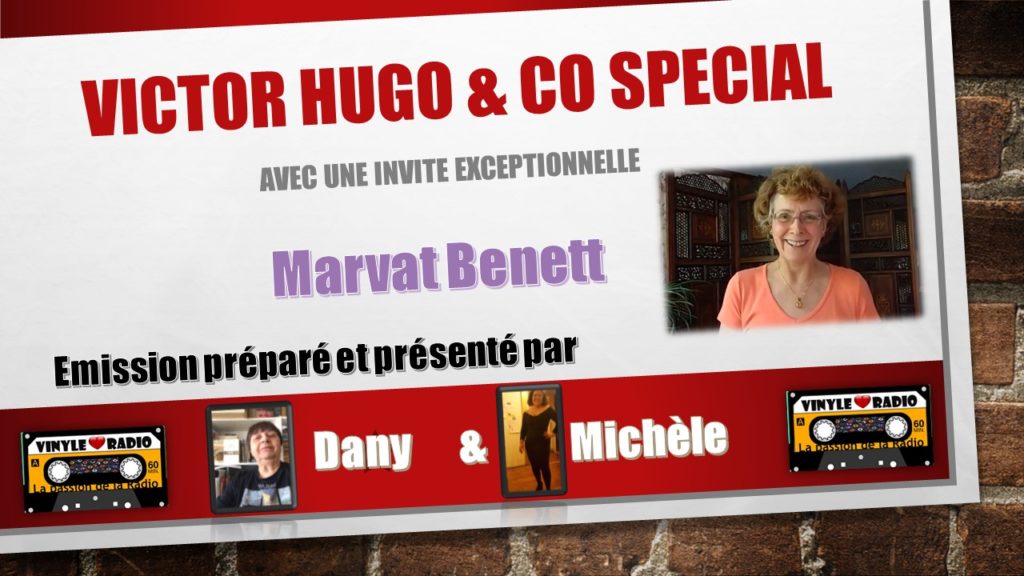

Listen below!

The students whose op-ed essays are posted here gave explicit permission for the postings. The guidelines for this end-of-semester assignment are below:
In this University Seminar, we’re looking at how literature—how Les Misérables in particular—relates to our lives today. With this writing assignment, you have a chance to convince a wider audience about why and how Les Misérables might or might not be relevant to them.
Your audience:
You are writing to the many people who look for ideas about how to make the world a better place and/or how to live their best lives. They read books and magazines, they peruse newspapers and online journalism, and they watch movies with an eye to considering how ideas they meet there inform their lives.
The genre: an online essay or op-ed
To reach a broad audience, I invite you to craft an online op-ed. You might already know a site where you would like to post your piece. Still, whether or not your essay appears on the web elsewhere, I would like to share your thoughts on the power of Hugo’s novel by posting your op-ed on my Victor Hugo website.
The op-ed—an opinion piece supported by evidence and logical argumentation and description—is a highly accessible piece of writing, one that literate people will engage with. It’s called “op-ed” because it traditionally appeared opposite the editorial page of the newspaper.
Op-eds typically concern either breaking news or currently ongoing stories (for example, immigration and the status of refugees, or Brexit, or healthcare in the U.S.). But they can also grow out of a personal experience, an anniversary, a contradiction, etc. (see the link on ledes just below). Because of the realities of our semester-long course, you may use as a springboard for your op-ed either current or past news or social concerns: that is, you can write about what you find to be most interesting in Les Misérables without being limited by current events. For some examples, see below.
Whether you write about a current or past event, you’ll need a lede (also called a news hook) which sets the scene and grabs your reader’s attention. Read more about possible ledes and news hooks here: http://www.theopedproject.org/index.php?option=com_content&view=article&id=69&Itemid=81.
The writing process and drafts:
To give you the opportunity to write the most compelling essay possible, you will get peer reviews of your best draft—and help two others. In that way, you will see how two classmates understand your ideas, and you will be able to see how others’ ideas come across to you. As peer reviewers, you will be working hard to imagine yourselves as people who may not have read Les Misérables and who have definitely not been privy to our rich conversations.
Stages of the writing process and Deadlines:
Your topic and the case you’ll make:
You can choose to write about either the social justice issues or the personal, individual challenges and triumphs that Hugo brings to life in Les Misérables. In either case, you are writing to convince your readers either that the novel has real contemporary relevance or that it is bound by its time and not really relevant to us today. You will also be implicitly writing about whether (and why or why not) literature has power in our lives. To convince your readers, you’ll need to refine a clear argument and support it with evidence and logical reasoning.
How to craft an op-ed, including length:
The structure of an op-ed is similar to that of a traditional academic paper in that you need to make an argument by articulating clearly your point of view and supporting it with evidence. Here’s a traditional op-ed organizational structure: http://www.theopedproject.org/index.php?option=com_content&view=article&id=68&Itemid=80.
Tips on writing an op-ed: http://www.theopedproject.org/index.php?option=com_content&view=article&id=67&Itemid=79
Again, your op-eds will be different from most in that your “lede” or “news hook”—the news story or event or personal story that prompts the op-ed—does not need to be current.
Today’s op-eds can range in length. Make yours between 600 and 800 words (and include the word count along with your name). If you are intrigued by op-eds and want to know more, see “More Than You Wanted to Know About Op-ed Length,” by Roland King: http://www.phairadvantage.com/2014/09/more-than-you-wanted-to-know-about-op-ed-length/.
How your Forum posts help you develop this essay:
As we read the novel, you’re invited to write in the Collab Forum about ways in which our world still holds wretched people whose lives are not all that different from Jean Valjean’s, Fantine’s, Gavroche’s, Marius’, and even Inspector Javert’s. Feel free to create your own Forum topic question around a relevant news story and practice writing a brief op-ed. Even when your Forum posts are not written as op-eds, the topics and takes chosen by your colleagues should provide a rich resource for choosing how you would like to focus your op-ed.
Sample relevant news stories:
I, of course, find Les Misérables to be highly relevant to our lives today. News stories that have struck me as connected to Les Misérables include these, for example:
Sample essays and op-eds:
Sample op-eds (and essays that have elements of op-eds) about Les Misérables:
Op-eds I have written connected to Les Misérables (all at The HuffPost, comments welcome!):
Jean Valjean, Emissary of Peace Who Seeks Peace
In Les Misérables, Victor Hugo offers us a broad vision of what he often called “universal peace,” a peace broader than that among nations. As we see in Jean Valjean’s actions, universal peace also refers to the peace found among individuals and to the peace felt in one’s soul. Valjean is at once an emissary of peace for others and a man who is looking for personal peace. Paradoxically, although Valjean feels only rarely peaceful in his own soul, he spreads peace around himself, making himself as much an agent of peace for his adopted daughter, Cosette (and, as a corollary, for Marius, too), as he does at the barricade and for Inspector Javert.
But how can the troubled soul of a man who has experienced so much injustice find any sort of peace? And how that soul manage to bring peace to others? That’s equally paradoxical. Still, Jean Valjean can spread peace because he is inspired by a respect for what is right, as Hugo defines it in his essay “Right and the Law” (“Le Droit et la loi”). Valjean is also inspired by the peace he sees in Monseigneur Myriel. But Valjean is torn between the anxieties prompted by society’s disdain of him and the attraction of the peace he feels when he is outside society or alone. As a result, his path toward peace and God is complicated.
Led by what is right, incarnating a desire for and tendancy toward peace, Jean Valjean shows us tangibly what progress toward personal peace can entail, something that Victor Hugo explains more theoretically in his essay. And, in the end, Valjean’s complex progress toward peace reflects the progress toward societal peace that revolution can create in an equally paradoxical way.
Jean Valjean, émissaire de la paix, à la recherche de la paix
par Marva A. Barnett
Présentation
Dans les Misérables, Victor Hugo nous offre une large vision de la paix universelle, où il ne s’agit pas uniquement de la paix entre les nations. Comme nous pouvons le constater grâce aux actions de Jean Valjean, la paix universelle se réfère également à la paix entre individus et a la paix dans l’âme. Valjean est à la fois un émissaire de la paix et un homme à la recherche de la paix. Même si Valjean ne trouve que rarement la paix dans son âme, il en répand autour de lui. Il se fait, paradoxalement, l’agent de la paix tant pour sa fille adoptive, Cosette (et accessoirement pour Marius aussi), qu’à la barricade et à l’égard de l’Inspecteur Javert.
Mais comment l’âme troublée d’un homme qui a subi tant d’injustices peut-elle contenir une forme quelconque de paix, et comment pourra-t-elle arriver à apporter la paix aux autres? C’est également paradoxal. Valjean a néanmoins la capacité d’apporter la paix aux autres parce qu’il est inspiré par le respect du droit, comme Hugo définit celui-ci dans son essai « le Droit et la loi. » Inspiré aussi par la paix qu’il retrouve chez Monseigneur Myriel mais tiraillé entre ses inquiétudes et la paix qu’il trouve le plus souvent en dehors de la société, Valjean se décide de devenir un honnête homme, comme lui propose l’évêque, et par suite, entre dans le chemin complexe vers la paix. Mené par le droit, incarnant le désir et la disposition à la paix, Jean Valjean nous montre le progrès personnel comme Victor Hugo l’envisage de façon plus théorique dans son essai, progrès que la révolution crée aussi paradoxalement pour les sociétés.
Victor Hugo, Visionnaire de la Paix, Colloque international à la Casa Victor Hugo,
La Havane, Cuba, 13-14 novembre 2019
Ce colloque international a eu lieu au cœur du 500e anniversaire de La Havane, et les éminents spécialistes sont venus de cinq parties du monde. Organisateurs :
Mercredi 13 novembre 2019
Séance 1 : « Extension du domaine de la Paix », présidée par Mme Florence Naugrette
Séance 2 : « Visages de la Paix », présidée par Mme Marva Barnett
Jeudi 14 novembre 2019
Séance 1 : « Œuvres de Paix » présidée par M. Jean-Marc Hovasse
Séance 2 : « Victor Hugo sans frontières », présidée par M. Samir Marzouki
L’ensemble des contributions, les échanges qui ont suivi, feront l’objet d’une publication bilingue, français/espagnol disponible en février 2020.
Résumé par M. Roger Grévoul, Président Fondateur de l’Association Cuba Coopération France, Directeur de Publication du site Internet et de la Lettre Hebdomadaire
Victor Hugo, Visionary for Peace, International Colloquium, Casa Victor Hugo, Havana, Cuba
November 13-14, 2019
(Victor Hugo, Visionnaire de la Paix, Colloque international à la Casa Victor Hugo, La Havane, Cuba)
The international colloquium took place in the context of Havana’s 500th anniversary, and eminent specialists came from the world’s five inhabited continents (Africa, Europe, Asia, America, and Oceania [or Australia]). Colloquium organizers:
Wednesday 13 November 2019
Session 1: “Broadening What’s Meant by Peace,” Mme Florence Naugrette presiding
Session 2: “Faces of Peace,” Mme Marva Barnett presiding
Thursday 14 november 2019
Session 1: “Works of Peace,” M. Jean-Marc Hovasse presiding
Session 2: “Victor Hugo beyond Borders,” M. Samir Marzouki presiding
The papers and exchanges they provoked will be published in a French/Spanish bilingual edition of the Colloquium Actes, planned for February 2020.
From the résumé by M. Roger Grévoul, Founding President of the Association Cuba Coopération France and Director of Website Publication and the Weekly Newsletter
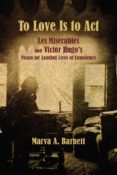
Foreword by Alain Boublil and Claude-Michel Schönberg
Introduction
Chapters:
1 Seeing Others
2 Why Forgive?
3 Love Is Action
4 Seeking—and Finding—God
5 Is Change Possible?
6 Listening to Our Best Selves
7 Either Valjean or Javert!
8 Finding Strength to Carry On
Appendices:
A Time Line of Hugo’s Life, Works, French History, and Les Misérables Events
B Titles of Hugo’s Works in French and English
C Further Resources

“Why would we listen to Victor Hugo today?” I asked actor and philanthropist Hugh Jackman. I’d found myself talking with Jackman as part of my search to understand the power of Hugo’s Les Misérables and its progeny. I was delighted to find that Jackman marvels at Hugo’s masterpiece as much as I do. One of the most famous novels ever written and a triumph of narrative art, Les Misérables speaks deeply to us both despite its daunting length. Hugo’s language lifts me, and his loving characters unendingly inspire—especially his hero, the ex-convict Jean Valjean, whom Jackman played in the 2012 movie version and got to know intimately, as the insights he shared with me will show.
Victor Hugo’s complete works inhabit forty-one inches of my bookshelves. In those poems, plays, novels, essays, speeches, letters, and graphic art, he aimed to create beauty but, more importantly, to prompt people to act through love and conscience to build a better world. In his epic Les Misérables, Hugo asks big questions about social justice and the daily decisions that define character. But he doesn’t just leave us with questions. He helps us think them through alongside his iconic characters.
Hugo’s experiences, excitement, and exhortations to action come through in “his” musical. And millions of people who haven’t picked up the novel love his rousing story through the show widely called Les Mis. The artists who created that international stage and screen sensation knew Hugo’s novel well and found it fascinating, so I wanted to hear from them. Hugh Jackman invested months in studying Les Misérables to get inside Jean Valjean’s skin. Obviously appreciating Hugo’s ability to convey human emotion with passion and without irony, Jackman expresses clearly how the novel’s real-world dimension touched him:
“What Victor Hugo was seeing in his backyard, really, in his country—this great inequity and this incredible injustice going on—is exactly the same today, and sparking pretty much most of the conflicts in the world. I know some of them seem to be veiled in religion, but I’m sure most of them start with poverty. There’s about a billion people on the planet hungry right now—all the time.”
At this point, Jackman sped up and spoke with even more intensity:
“How can we carry on with our lives just because it’s not in our backyard—even though some of it is—how can we just carry on? Even climate change, poverty’s completely linked to that. So I do think that Les Misérables is definitely valid today. When I read it, it certainly touched me on a personal level, just in terms of what are you prepared to stand up for and what are you prepared to do?”
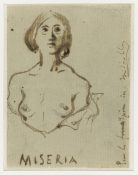
My University of Virginia students and I ask ourselves similar questions while reading and discussing Les Misérables, and we find remarkable parallels between contemporary social issues and the ones Hugo confronted. In fact, isn’t our world an even bigger challenge for people who care, for those who want to follow their conscience? With digital access and news 24/7, we’re bombarded with tragedies at home and around the world. So many people in need, so many cultures battling each other, the very land we live on and water we drink in peril. How can we absorb the news of one more random shooting or terrorist attack—much less help the myriad earthquake or hurricane victims, or the single mom struggling to support her children? How can those of us who are not in the “1%” respond to today’s economic inequities? It seems at times that our social systems are collapsing, and compassion fatigue can strike.
Closer to home, our private lives can be just as difficult. How can we stay focused on our jobs when someone we love is seriously ill? Even when life goes smoothly, how do we balance work and family? How much should I help others when people say that I must take care of myself first? When I see injustices around me, how can I make things better? Where do I find the resilience so highly touted for happiness and long life? We all face times when it would be easier to throw in the towel. How on earth can we get help from a French poet who died over 130 years ago?
Quite simply, Victor Hugo lived an extraordinary life, a life of broad experience, compassion, and conscience. “Live and learn” might have been Hugo’s motto, as he evolved from a royalist into a liberal, moved forward after shattering family losses, and grew in spiritual understanding. His work encourages us to recognize the significance of our experiences and build on them, as he did. Despite many obstacles and setbacks—and despite his oh-so-human personal shortcomings—Hugo never considered giving up his tenacious fights for democratic ideals and social justice, for women’s rights and children’s education, for a united Europe and world peace. He spoke out because he cared. Practically the last words he wrote were “To love is to act” (”Aimer, c’est agir”).
With Les Misérables Hugo explored what our human capacity for love can do for us, especially focusing on how love prompts conscientious living. For Hugo, love engenders hope and underpins our God-given conscience, which spurs us toward selflessness. Ultimately, through his characters’ resplendent responses to misery, he shows how we, too, can grow individually and make the world a better place. Hugo grappled with social issues like the poet he was—by envisioning grand possibilities. Confronting some of his own flaws, he aimed in daily life to follow his conscience and put into action his love for humanity. In To Love Is to Act, we’ll explore how crucial events in Hugo’s life relate to his universal Les Misérables themes, beginning with his life-changing experiences just before he started his novel, and then turning to how his life and ideas can inspire us today.
That’s the end of this excerpt. To see what the Introduction has to say about how Hugo’s remarkable life connects to Les Misérables, how people have responded to the novel over the past 130 years, what the Les Mis artists see in Hugo’s work, and why the story resonates with so many still today, get To Love Is to Act (publication currently planned for late December or January).
Learn more about the book at To Love Is to Act: Les Misérables and Victor Hugo’s Vision for Leading Lives of Conscience. Buy the book: University of Chicago Press / Amazon
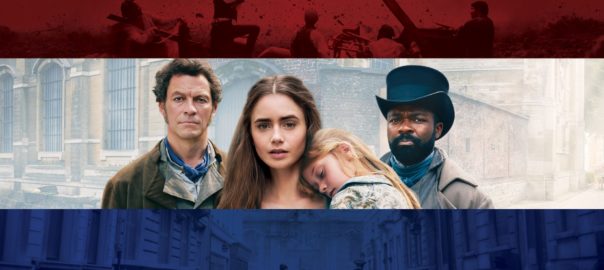
 Those are just a few reasons why you’d enjoy this six-week discussion group around PBS Masterpiece’s upcoming broadcast of the BBC’s Les Misérables, which received rave reviews during its British premiere last winter. This six-part miniseries brings Victor Hugo’s epic story of love, forgiveness, and redemption to life on screen yet again, prompting us to consider how his guiding principles for life can help us. Schönberg and Boublil’s music and lyrics are not there—but Hugo’s deep understanding of our humanity is.
Those are just a few reasons why you’d enjoy this six-week discussion group around PBS Masterpiece’s upcoming broadcast of the BBC’s Les Misérables, which received rave reviews during its British premiere last winter. This six-part miniseries brings Victor Hugo’s epic story of love, forgiveness, and redemption to life on screen yet again, prompting us to consider how his guiding principles for life can help us. Schönberg and Boublil’s music and lyrics are not there—but Hugo’s deep understanding of our humanity is.
You are welcome whether you have read Hugo’s novel or not. I look forward to exchanging ideas, as I’ve much enjoyed teaching the novel at UVA and thinking about it for my book To Love Is to Act: Les Misérables and Victor Hugo’s Vision for Leading Lives of Conscience will be published this fall by Swan Isle Press.
Les Misérables will air at 9:00 p.m. Sunday evenings (and stream online) beginning on April 14. Here’s the trailer:
Our discussion group will meet on the following Wednesday evenings (April 17 through May 22) from 7:00-8:15 p.m. at the Gordon Avenue Library small meeting room to share our reactions, questions, and ideas about why this classic still speaks so compellingly to us today. Space is limited! Email me(marva@virginia.edu) to save a place, and confirm which days you can attend.
What are the dates of the course?
Friday, December 28, 2018, through Thursday, January 10, 2019. Normal travel dates for this course: departure from the U.S. on December 27 (arrival on December 28) and departure from Paris on January 11.
Where will we be staying in Paris?
Students will be housed in apartments in a modern hotel a few blocks north of the Place de la Bastille and a 10-minute walk to the Victor Hugo Museum in the Place des Vosges. Single and double rooms come equipped with kitchenettes, bath, ironing board and iron. Breakfast is included. Self-serve laundry facilities are available on-site for an additional fee. The apartment/kitchen situation enables you to save on meals if you choose to shop and eat in your apa rtment. A Casino supermarket is five minutes away. Our classes will take place in a comfortable hotel meeting room with projector and screen. Here is the hotel lobby:
rtment. A Casino supermarket is five minutes away. Our classes will take place in a comfortable hotel meeting room with projector and screen. Here is the hotel lobby:
and a view of the July Column at the Place de la Bastille, from the front of the hotel: 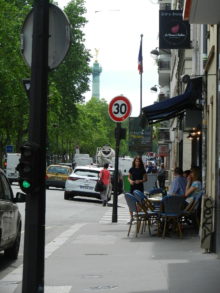
Do we travel to Paris on our own or as a group?
You make your own travel arrangements.
How much does the course cost?
The total estimated cost to participate in this two-week program, including hotel, required museum entrance fees, Navigo pass for unlimited public transportation in Paris, as well as estimated airfare and meals: $5,750 for in-state students; $6,071 for out-of-state students. For more details, see the Budget Sheet from UVA Education Abroad.
Do I need to know French?
No, you need not know French, as the course will be taught entirely in English. Several of our French guest speakers speak fluent English. For those who do not, Marva will summarize in English the remarks they make in French.
Who is the instructor?
University of Virginia Professor Emerita and internationally-recognized Victor Hugo expert Marva Barnett has designed this course to give participants special insights into Paris through the eyes and experiences of the nineteenth-century poet, novelist, playwright, artist, social commentator and legislator who was Victor Hugo. She brings numerous experiences to the course:
What will the daily schedule look like?
Mondays through Saturdays we will typically begin the day with an hour-long class in which we debrief the preceding day’s activities, discuss the assigned readings and introduce the site(s) we will visit that morning. In the afternoon/evening, you will have time to read the material for the following days—unless you choose to read ahead before the course begins—and to explore Paris on your own. As part of the course, in fact, you will be asked to be a flâneur / flâneuse, that is, to stroll with no specific destination and to observe.
For about half our meeting days, we will have the pleasure of welcoming each of these renowned Hugo scholars and curators of Hugo’s manuscripts, letters and artwork:
On Sundays there will be no class, but you will have reading and writing assignments for the course and time to visit an optional site or two. A list of optional sites on the syllabus will help introduce you to Paris possibilities, but you are free to visit whatever sites you like.
We plan to spend one evening attending a French play with English supertitles—one of Hugo’s, if we’re lucky!
What will the workload be?
In this course focused on discussion (with occasional informational lecturing), evaluation of your accomplishments will depend on the following work, which is designed to help you accomplish the course goals and recognize your progress:
Is the syllabus available?
Click here for the Draft Syllabus. Students accepted into the course will have access to the detailed syllabus with complete reading list and site visits.
Who is the course designed for?
Adult students in the University of Virginia Bachelor of Interdisciplinary Studies (BIS) Program who are eager to explore Paris through Victor Hugo’s life and work. UVA undergraduate students, students and other colleges/universities, and adults interested in this course are also encouraged to apply.
Important note for UVA undergraduate students: Students in any college at UVA except the College of Arts & Sciences (CLAS) may receive degree credit for courses offered through the BIS Program. CLAS students, however, cannot receive College degree credit for courses offered through the BIS Program.
I’m not a UVA student—may I apply to this course?
Yes, you are welcome to apply to be admitted to “Victor Hugo’s Paris,” whether you are a full-time student at another university/college—or someone who is not currently a student but who holds a BA/BS or advanced degree. In either case, to be considered for the course, complete the on-line program application here: https://educationabroad.virginia.edu/how-to-apply.
If you are a full-time student at another university/college, you will find eligibility and requirements at http://educationabroad.virginia.edu/non-uva-students.
If you are not currently a student and hold a BA/BS or advanced degree, you would submit as part of the application process the data necessary in order to be admitted as a visiting, non-degree graduate student if you are admitted to the course and if you accept that offer (including a transcript and a letter of recommendation).
Individuals admitted as visiting, non-degree students committed to the course will be subject to all UVA academic and non-academic policies and procedures. These include the Standards of Conduct, Honor, and financial rules. These students will also enjoy and carry all the associated rights, privileges, and responsibilities.
How do I apply?
The APPLICATION DEADLINE is October 1, 2018. To apply, go to the UVA Education Abroad site. ants are notified of their status by mid-October. See important information and requirements at https://educationabroad.virginia.edu/how-to-apply.
Other questions?
For specific questions about the course itself, email Marva: marva@virginia.edu.
For questions about the application process, contact Martha Sadler, Education Abroad Advisor: ms2aw@virginia.edu; (434) 924-9159